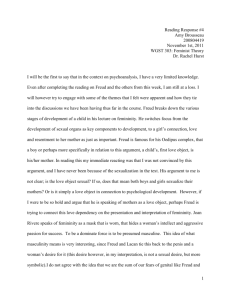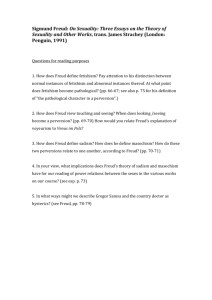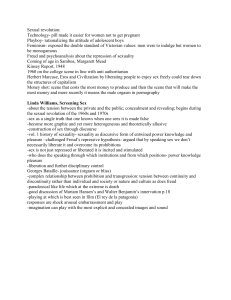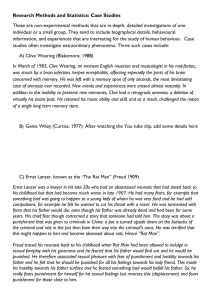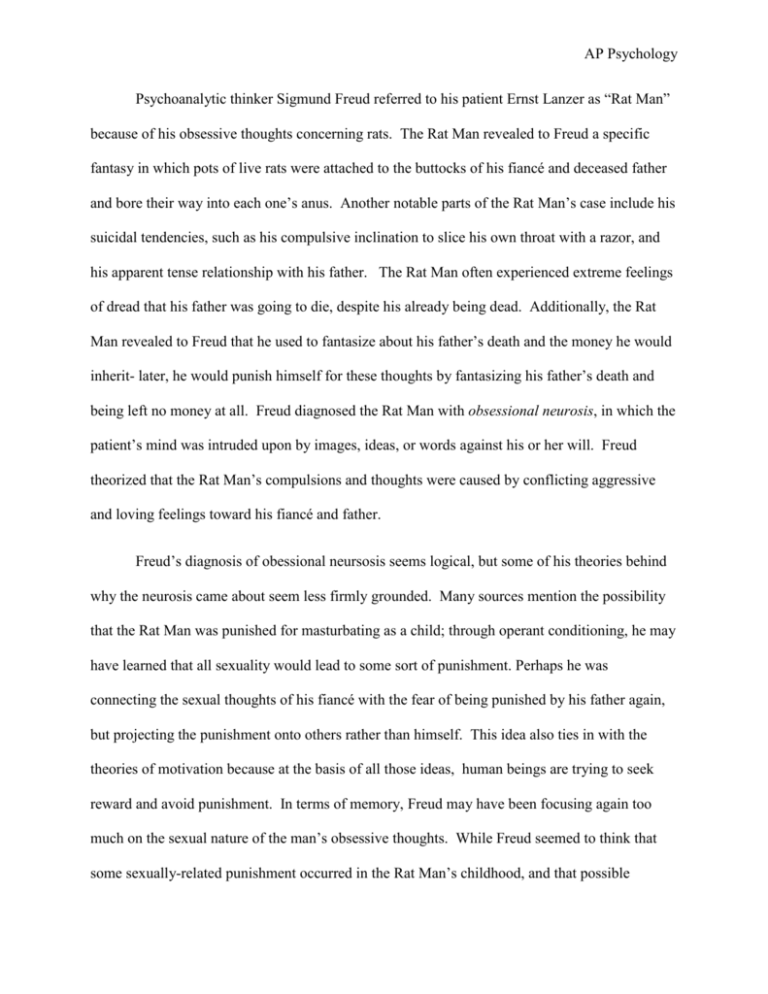
AP Psychology
Psychoanalytic thinker Sigmund Freud referred to his patient Ernst Lanzer as “Rat Man”
because of his obsessive thoughts concerning rats. The Rat Man revealed to Freud a specific
fantasy in which pots of live rats were attached to the buttocks of his fiancé and deceased father
and bore their way into each one’s anus. Another notable parts of the Rat Man’s case include his
suicidal tendencies, such as his compulsive inclination to slice his own throat with a razor, and
his apparent tense relationship with his father. The Rat Man often experienced extreme feelings
of dread that his father was going to die, despite his already being dead. Additionally, the Rat
Man revealed to Freud that he used to fantasize about his father’s death and the money he would
inherit- later, he would punish himself for these thoughts by fantasizing his father’s death and
being left no money at all. Freud diagnosed the Rat Man with obsessional neurosis, in which the
patient’s mind was intruded upon by images, ideas, or words against his or her will. Freud
theorized that the Rat Man’s compulsions and thoughts were caused by conflicting aggressive
and loving feelings toward his fiancé and father.
Freud’s diagnosis of obessional neursosis seems logical, but some of his theories behind
why the neurosis came about seem less firmly grounded. Many sources mention the possibility
that the Rat Man was punished for masturbating as a child; through operant conditioning, he may
have learned that all sexuality would lead to some sort of punishment. Perhaps he was
connecting the sexual thoughts of his fiancé with the fear of being punished by his father again,
but projecting the punishment onto others rather than himself. This idea also ties in with the
theories of motivation because at the basis of all those ideas, human beings are trying to seek
reward and avoid punishment. In terms of memory, Freud may have been focusing again too
much on the sexual nature of the man’s obsessive thoughts. While Freud seemed to think that
some sexually-related punishment occurred in the Rat Man’s childhood, and that possible
AP Psychology
memory repression had occurred and he was just expressing those feelings through a recurring
thought, it seems more likely that when the idea of rat torture was mentioned to Lanzer by a
military officer, the twisted nature of it stuck with him because it was so disturbing.
In terms of ethics, Freud followed a fairly respectable course in his treatment of Ernst
Lanzer. However, there is speculation that the case was used to raise Freud’s position in the
psychological community. In discussing the treatment, it is seen that Freud would change the
length of time in which he saw Lanzer. It also appears that Freud considered the treatment a
great success and that the Rat Man was able to return to a normal life, but little follow-up ever
occurred on the case. During the treatment itself, it is also possible that Freud made suggestions
to his patient in order to hear what he wanted. As Freud employed “the talking cure,” certain
statements made by Freud may have persuaded Lanzer to say certain things. Overall, it appears
that no serious damage would have been done to Lanzer through Freud’s methods, but the
question is whether or not Freud’s intentions were entirely pure.




